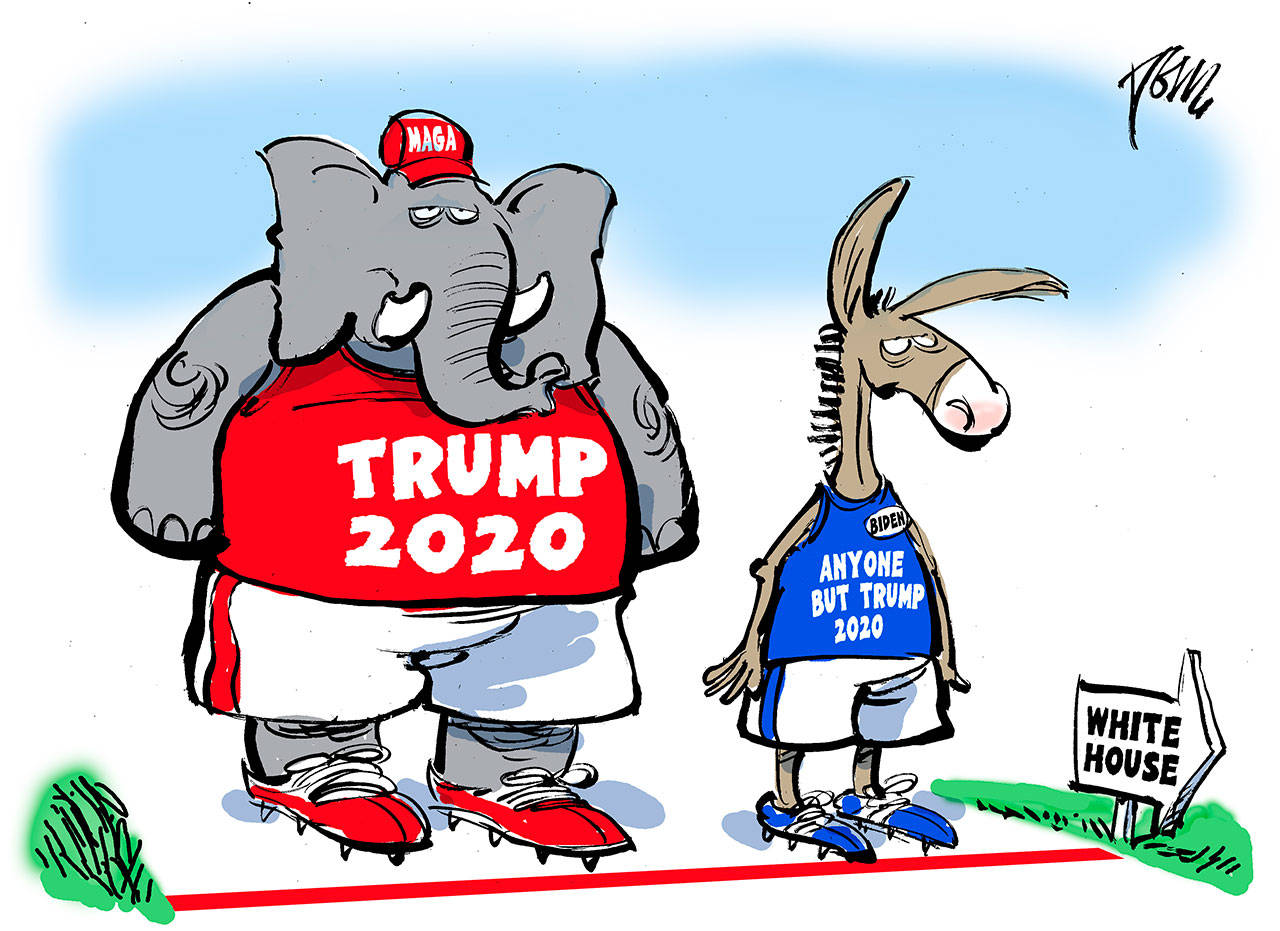Watching clips from the virtual Democratic convention I was not struck by what I thought I would see and feel. I was impressed by something else.
I thought I would miss the trappings of an old-fashioned political convention — the roar of the crowd, the platform fights, the plots and intrigues crushed, the old pols making the rounds, and the old pro reporters, when such were still employed by TV networks, interviewing the old pols (instead of each other) — all of them plying their craft one more time, working the hall.
But that’s not what I missed and not what I noticed. In truth, conventions have been empty shells for a very long time.
What I noticed was the grimness. No one was having any fun. No one smiled. No one said anything funny or memorable.
It was a steady parade of “J’accuse.” A nonstop recitation of impending doom by one Chicken Little after another. If you don’t put us in power and do things our way, fellow citizens, it’s all over for you, for your family and for this country.
It will be the same with the Republicans. It will be a solemn recitation of impending catastrophe, accompanied by the same message, but about the opposite people: They (your neighbors, actually) are your dangerous enemies.
And to all this I say as I have said in this space before: Rubbish. The country is bigger and stronger than that.
We are in it for the long game — the long arc of history, which we must make sure bends toward justice.
But surely we can do that with patience and respect for one another and the differences between us.
Diversity, not of appearance but of thoughts and ideas, is not only OK, it is the point of the democratic experiment.
And we can do it with a little joy, a little sport.
I have been celebrating the late, great Daniel Patrick Moynihan in this space recently. There is a wonderful clip from one of his appearances on “Meet the Press,” in which he is asked, will there be a “fight to the death over taxes?” Rearing back and with a twinkle in his eye, he answered: “Fight until death over taxes? Oh no. Women. Country. God. Things like that. Taxes? No.”
Have you ever watched tapes of President John F. Kennedy’s press conferences? The wit is so sharp and so fast that you want the thing to go on and on. Those performances are a thing of beauty.
Think of Ronald Reagan. Think of Churchill. What is the first and last impression?
Wit. They enjoyed politics. They could puncture its dullness because they cared enough to be virtuosos.
Is this because they were just fun or funny guys? I don’t think so. I think it is because they understood what the founders called the spirit of public happiness. Politics and government were not, to Kennedy or Churchill, dirty or hateful or something to tolerate on days you don’t despise them. Politics and government are worth doing, a service to the public, a noble craft, and for some (like JFK sparring with the press) something like an art form.
The Republicans think government is the problem — the problem. They have been running on that since Hoover.
Well, sometimes it is. Because progressives do not understand unintended consequences. They don’t get that solutions are never any more than proximate and that all fixes are, ultimately, trade-offs.
But sometimes government is the only fitting means or instrument of response. We need an Army. We need police. I am glad that FDR created Social Security and that about five Democratic senators in the 1960s and 1970s expanded it.
Missing today, almost as acutely as moderation and toleration, is joy in action, zest in debate and something terribly crucial —e fficacy.
How can you enjoy the human art of politics — as human as singing — if you don’t think it matters and you hate the other participants?
Boxers come away from the fight in far worse shape than politicians, yet they respect each other and love the craft, and the science of the ring.
The founders all had other things to do with their lives and they definitely wanted to limit politics and government. Yet they loved both. Loved the practice of both and loved to write and think about both. They felt there was satisfaction to be had, joy, in public life.
You need public spaces for politics to happen. And true citizenship.
Our public spaces are shrinking to the virtual, where speech is cheap and tawdry and defamatory.
Citizens are shrinking into bots.
We should fear the death of democracy. But that death will come not from one man, but from the death of liberty under law and the death of public happiness; the death of due process and the loss of satisfaction in public duty.
Republicans hate politics as a matter of creed. Michelle Obama always reminds us that she hates it, and she is praised for this. Because politics is low.
But Moynihan said it was high — the highest of callings.
Pressed to label himself, Moynihan called himself an “Al Smith Democrat.” Al Smith was called “the Happy Warrior.”
“Happy Days Are Here Again” was FDR’s campaign song. What would be Trump’s? The theme from “Jaws”? What would be Biden’s? “Everything Is Broken”?
The last American politician to try to talk about the spirit of public happiness and seek its revival was Eugene J. McCarthy, who turned anger, division and alienation into a practical electoral movement, fueled by hope, in the bloody and sad year of 1968. He was an old baseball and hockey player. He used to tell his staff, infused with impassioned and idealistic youth, “In this game, you have to have a little fun every day.”
Keith C. Burris is executive editor of the Pittsburgh Post-Gazette, and vice president and editorial director of Block Newspapers(kburris@post-gazette.com).



